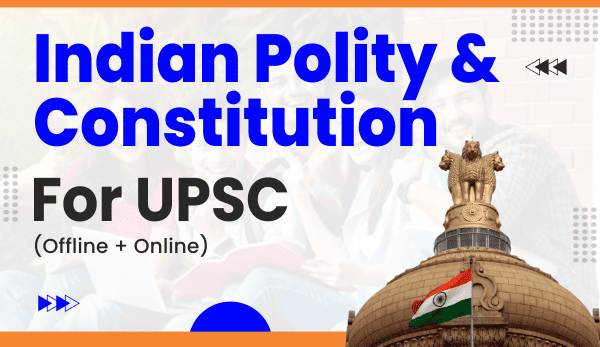Syllabus of Polity in Prelims stage
Indian Polity and Governance: Constitution, Political System, Panchayati Raj, Public Policy, Rights Issues, etc.
Year-wise marks weightage of Polity in prelims (2013-2023)
| Year |
No of Questions |
Marks |
| 2023 |
19 |
38 |
| 2022 |
15 |
30 |
| 2021 |
18 |
36 |
| 2020 |
18 |
36 |
| 2019 |
18 |
35 |
| 2018 |
13 |
26 |
| 2017 |
23 |
46 |
| 2016 |
9 |
18 |
| 2015 |
12 |
24 |
| 2014 |
13 |
26 |
| 2013 |
18 |
36 |
Syllabus of Polity in Mains Stage
- Indian Constitution – historical underpinnings, evolution, features, amendments, significant provisions and basic structure
- Functions and responsibilities of the Union and the States, issues and challenges pertaining to the federal structure, devolution of powers and finances up to local levels and challenges therein
- Comparison of the Indian constitutional scheme with that of other countries
- Separation of powers between various organs dispute redressal mechanisms and institutions
- Parliament and State Legislatures – structure, functioning, the conduct of business, powers & privileges and issues arising out of these
- Appointment to various Constitutional posts, powers, functions and responsibilities of various Constitutional Bodies
- Structure, organization and functioning of the Executive and the Judiciary Ministries and Departments of the Government; pressure groups and formal/informal associations and their role in the Polity
- Salient features of the Representation of People’s Act
- Government policies and interventions for development in various sectors and issues arising out of their design and implementation
- Statutory, regulatory and various quasi-judicial bodies
know About Strategy
To excel in Polity subject, aspirants should adopt a multi-dimensional approach
- In-depth Study
- Focus on the Constitution, bare acts, NCERT textbooks, and standard reference books like Laxmikanth or D D Basu etc.
- Current Affairs
- Stay updated with current political events, bills, policies, and judicial pronouncements.
- Practice and Revision
- Regular mock tests, solving previous years’ question papers, and revising concepts are essential.
- Analytical Approach
- Develop critical thinking to analyze and interpret various provisions and their practical implications.
- Integrated approach
- Relate Indian Polity with other subjects like History, Economics, and International Relations for a holistic understanding.
Indian Polity GS Module Features
- Comprehensive Coverage
- Comprehensive coverage of Polity for both Prelims & Mains
- Live/Recorded
- Live/Recorded lectures with 6 months access
- Current Events
- Detailed time table with daily targets
- Smart Notes
- Lecture wise smart notes for revision
- Solving of MCQs
- Solving of MCQs in each lecture & Answer writing practice in each lecture
- Mentorship
- Mentorship & Tests (prelims and mains) of Polity
Micro listing of Chapters
| Chapter |
No of Classes |
| Constitutional Framework |
- Constitutionalism
- Historical Underpinnings
- Evolution & Making of the Constitution
- Features and Significant Provisions
- Political system
- The Preamble
- The Union and its Territory
- Citizenship
- Fundamental Rights
- Directive Principles
- Fundamental Duties
- Amendment of Constitution
- Basic Structure of the Constitution
- Emergency Provisions
|
20 |
| Central Govt |
- President of India
- Vice President of India
- Prime minister
- Central Council of Ministers
- Parliament
- Cabinet Committees
- Parliamentary Committees
|
20 |
| State Govt |
- Governor
- Chief Minister
- State Council of Ministers
- State Legislature
- High court
|
10 |
| Local Govt |
- Panchayati Raj
- Local Urban Government
|
5 |
| Constitutional & Non-Constitutional Bodies |
- Constitutional Bodies
- Non-Constitutional Bodies
|
5 |
| Electoral system & Electoral reforms |
- Pressure groups
- Elections & political parties
- Representation of People's Act
- Election Process.
|
5 |
| Other Constitutional Dimensions & Miscellaneous |
- Co-operative Societies
- Official Language
- Public Services
- Tribunals
- Special provisions for SCs, STs, BCs, Minorities
- Anti-defection law.
|
5 |
| Total classes (each class 1.5 hours duration) |
70 |

